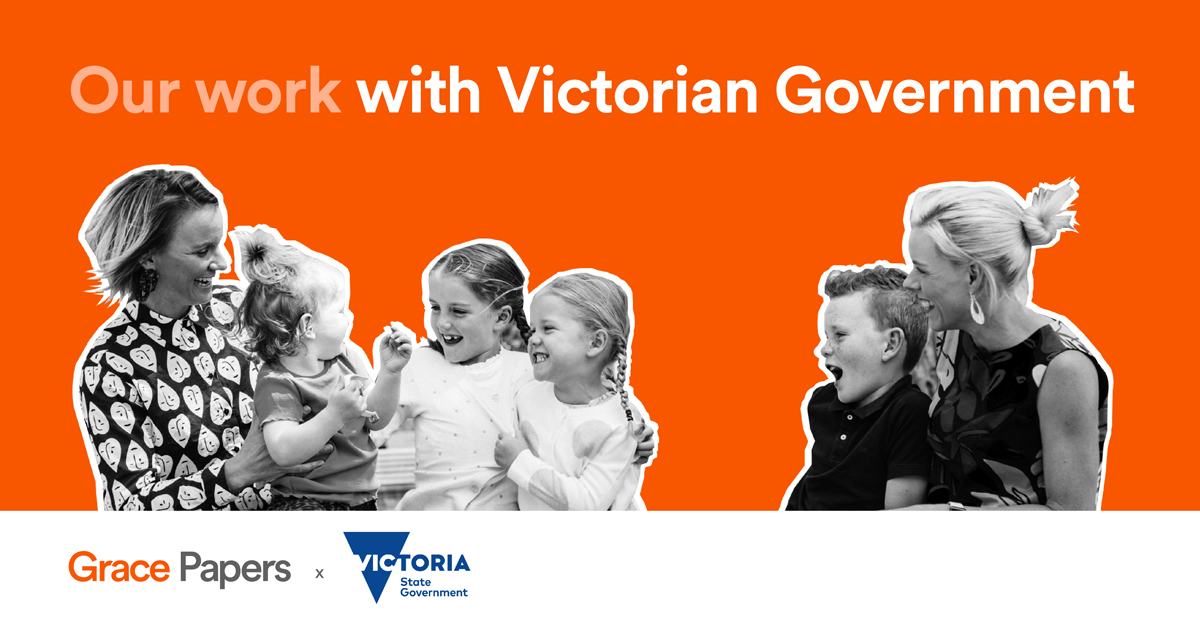The results speak for themselves.
An independent evaluation of the Grace Papers program shows it is making clear and quantifiable improvements to gender equality and the confidence of working parents.
The Macquarie University study of the Grace Papers partnership with the Victorian Public Service (VPS) shows 70 per cent of program participants gained a better understanding of how to initiate and manage their career transitions. And 78 per cent felt more confident about approaching their manager about career-related issues such as parental leave or flexible work arrangements.
It was also shown that participants identifying as LGBTIQ or culturally diverse experienced higher gains from The Grace Papers platform model.
Macquarie, which is ranked among the top two per cent of universities in the world, released its findings on the effectiveness of Grace Papers’ work across the VPS last year.
Research team leader Raymond Trau says the study is living proof that organisations need to develop progressive parental leave policies and practices.
“Our research to date has found that the GPP is building crucial and critical evidence around gender equality intervention,” he adds.
Grace Papers chief Prue Gilbert says the Macquarie evaluation was a welcome endorsement of the Grace Papers Gender Equality System and Program (GPP).
“While most research into gender equality focuses on the problems, this research set out to show us what works,” she says.
“When we empower working parents with knowledge and equip them with an understanding of how to apply their agency, they feel more confident in managing not just parental leave and flexibility but can apply that agency to any career issue with confidence.”
The Victorian Minister for Women, Gabrielle Williams, is equally certain that Grace Papers is creating cultural change for the better of all.
“The Grace Papers’ program proves that when we support employers to value care and entrench flexibility, we can create a culture where careers and families thrive,” she says.
GPP offers support for participants and their managers, providing agency and empowerment. In addition to online services such as customised access to workplace policies and procedures, participants are guided with phone coaching and Keeping in Touch (KIT) sessions.
Victorian Department of Health and Human Services employee Claire Sherwill says the GPP helped her navigate a pioneering job-share arrangement with her colleague and friend Kristyn Hanna.
“Grace Papers was talking a language that was appealing to us, “Claire explains.
“All their material, their approach and their guidance resonated with the journey we were on. They were able to provide coaching and support both in preparing us for interview (including an impromptu coaching session on Collins St when I randomly ran into Prue!) and helping us transition into the role as a job-share team.
“Their support has been relatable, easy to navigate, while also being thought provoking. Once engaged with Grace Papers we felt we were part of a family.
“They have helped us to own our professional vision and not let flexibility get in the way of progressing our careers.”
Claire’s positive experience with GPP is echoed by the Victorian Department of Education’s Joel Backwell.
The father-of-two is a passionate advocate for change who feels a responsibility to lead by example when it comes to flexible work arrangements.
After all, making small cultural changes in the workplace, he says, can lead to wider societal change.
“As Annabelle Crabb put it so well in her Quarterly Essay, ‘Men at Work’, when we have a culture that encourages men to stay at work then we are effectively encouraging women to stay home,” he says.
Unfortunately, it is still commonly assumed that women, once they become parents, are less ambitious than men. This assumption, together with gendered expectations, see that 95 per cent of primary paid parental leave is taken by women and 49 per cent of women face workplace discrimination throughout their parental leave journey.
“The path of a working mother may be well-trodden but is by no means a walk in the park,” she explains.
“In fact, it is often riddled with assumptions and discrimination, which is not without serious consequence.
“With impacted levels of female participation in the workforce, reduced career advancement and limited lifetime economic security, there is an urgent need for change to achieve broad gender equality.”
Trying to address systemic problems like gender equality could feel overwhelmingly insurmountable at first, Prue says. But the study showed that with Grace Papers’ expert guidance, it was indeed possible to change out-dated mindsets about parenting and find better work/life balance.
“While the findings and recommendations in this report are specific to the Victorian Public Service, the data and insights from this project can be applied broadly to other organisations and across industries,” Prue explains.
“With compelling data and evidence at the ready to support their actions. I am delighted by the results of this program and the opportunity the VPS has presented to pave the way for organisations and employers across Australia in working toward greater gender equality.”




